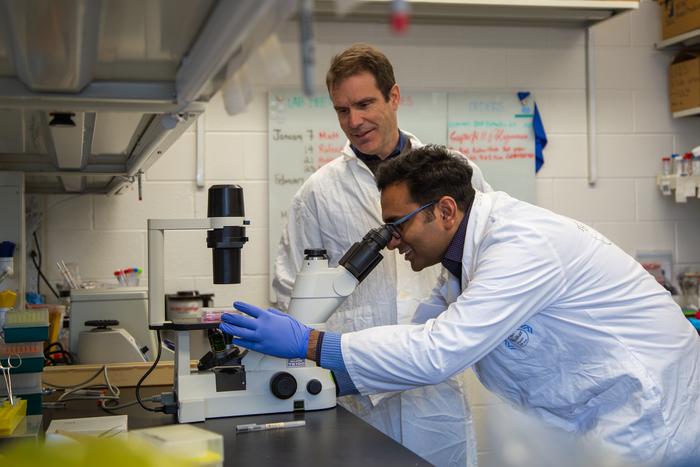Researchers at the University of Toronto have recently unearthed a striking connection between dietary habits and colorectal cancer, shedding light on how a low-carbohydrate diet may exacerbate the DNA-damaging effects caused by certain gut microbes. This groundbreaking study, published in the prestigious journal Nature Microbiology, delves into the intricate interplay between diet, gut bacteria, and cancer risk, revealing critical insights that could reshape our understanding of dietary influences on cancer development.
The research team conducted an experimental study using mouse models, where they meticulously compared the effects of three distinct diets on the development of colorectal cancer: a normal diet, a low-carbohydrate diet, and a Western-style diet characterized by high fat and sugar. Through this innovative approach, the researchers aimed to unravel the specific interactions between dietary components and gut microbiota in the context of cancer susceptibility.
Among their findings, the team highlighted a particular strain of Escherichia coli bacteria that, when combined with a low-carbohydrate diet devoid of soluble fiber, resulted in the acceleration of polyp formation within the colon—precursors to cancer. This discovery is significant as it emphasizes the role of specific bacteria, once thought to be merely passengers in our digestive systems, as potential culprits in cancer development when influenced by dietary choices.
Senior author Professor Alberto Martin articulated the longstanding perspective that colorectal cancer is a multifactorial disease, influenced by genetics, environmental factors, and diet. His team’s research poses a pivotal question: Can alterations in diet influence specific bacteria’s cancer-causing potentials? By honing in on this interplay, the researchers aim to address the critical gaps in understanding how particular diets could either mitigate or magnify the risks associated with these microbial agents.
The study utilized a combination of genetic and dietary variables among mice colonized with various species of bacteria. In one striking outcome, the researchers observed that only the combination of a low-carbohydrate diet and the colibactin-producing E. coli led to a notable incidence of colorectal cancer. This suggests that dietary composition can modulate not only the presence of bacteria but also their pathogenic potential.
Significantly, the researchers noted that a low-fiber diet can contribute to heightened inflammation in the gut, creating an environment where colibactin-producing E. coli can flourish. The integrity of the gut barrier, particularly a mucus layer that protects colon epithelial cells from microbial assault, was found to be compromised in mice fed a low-carbohydrate diet, allowing colibactin to more readily inflict genetic damage. This finding is particularly sobering given that mice with existing mutations in the mismatch repair pathway—a pathway that plays a critical role in DNA repair—experienced exacerbated effects from this dietary intervention.
While these results need to be validated in human populations, the implications are profound. The increasing popularity of low-carbohydrate diets, often seen as a route to weight management and overall health improvement, could inadvertently pose new risks for colorectal cancer, especially in genetically predisposed individuals. As the researchers suggest, it may be vital for those with a history of Lynch syndrome—a genetic condition correlated with elevated cancer risk—to consider their dietary choices carefully, particularly in regard to carbohydrate intake.
Among the pivotal aspects of this research is the observation that supplementation of a low-carbohydrate diet with soluble fiber yielded a protective effect against the proliferation of colibactin-producing E. coli. This crucial finding opens avenues for exploration into fiber’s role in enhancing gut health and mitigating cancer risks. The researchers are particularly interested in identifying which sources of soluble fiber, such as inulin, may exert the most beneficial effects on the microbiome in high-risk populations, including those with inflammatory bowel disease.
As public health discourses increasingly focus on the dietary habits of populations, this study serves as a critical reminder of the complex dynamics entwined in our gut microbiota and the dietary choices we make. Martin and Thakur emphasize that while further research is essential to confirm these findings, raising awareness about the relationship between diet and gut health is imperative for cancer prevention strategies.
In conclusion, the study conducted by the University of Toronto team not only elucidates the potential risks associated with low-carbohydrate, low-fiber diets but also advocates for informed dietary choices that can empower individuals in the fight against colorectal cancer. By understanding the microbial dimensions of dietary impacts, we can better approach nutrition as a foundational pillar in cancer prevention, urging both healthcare providers and the public to reconsider the implications of their dietary choices.
Subject of Research: Animals
Article Title: Dietary fibre counters the oncogenic potential of colibactin-producing Escherichia coli in colorectal cancer
News Publication Date: 3-Mar-2025
Web References: Nature Microbiology
References: DOI Link
Image Credits: Erin Howe/University of Toronto
Keywords: colorectal cancer, Escherichia coli, low-carb diet, dietary fiber, gut microbiome, inflammation, colibactin, cancer prevention.
Tags: cancer susceptibility and dietary habitsdietary influences on cancer developmentEscherichia coli and cancerfiber deficiency and cancer riskgut microbiota and cancer riskimpact of diet on gut bacterialow-carb diet and colorectal cancerlow-carbohydrate diet effectsmicrobiome’s role in cancerpolyp formation and dietrelationship between diet and gut healthUniversity of Toronto colorectal cancer study





